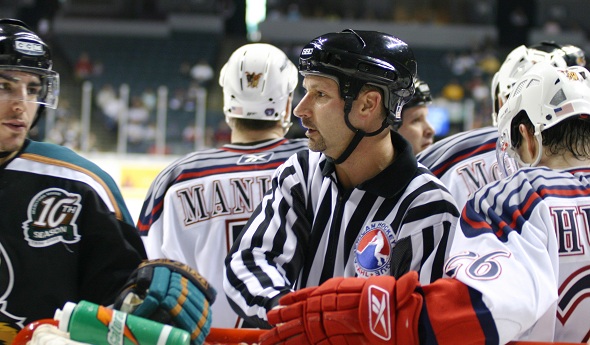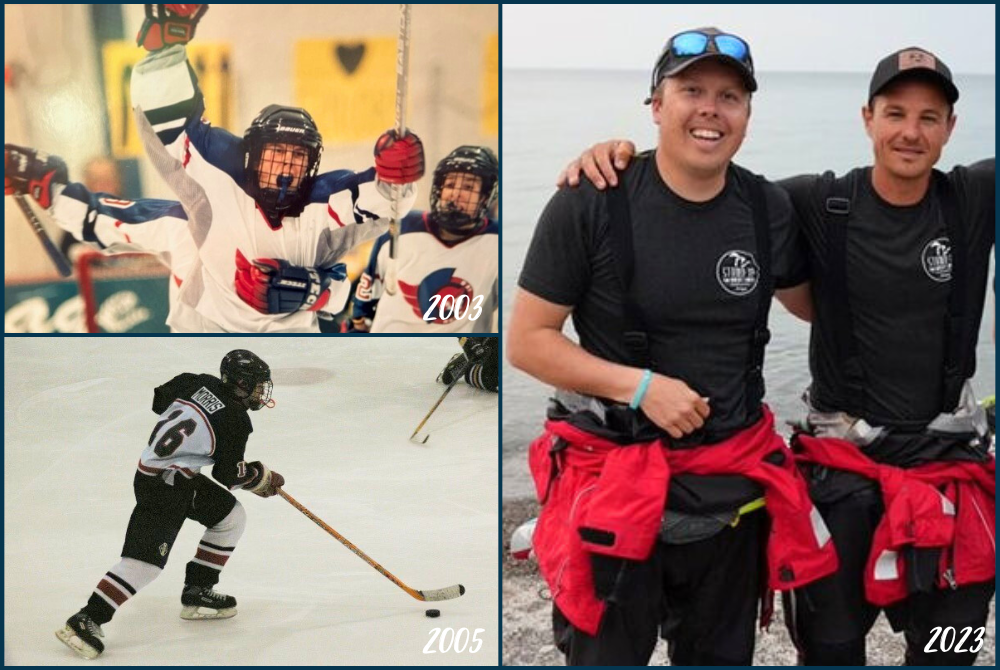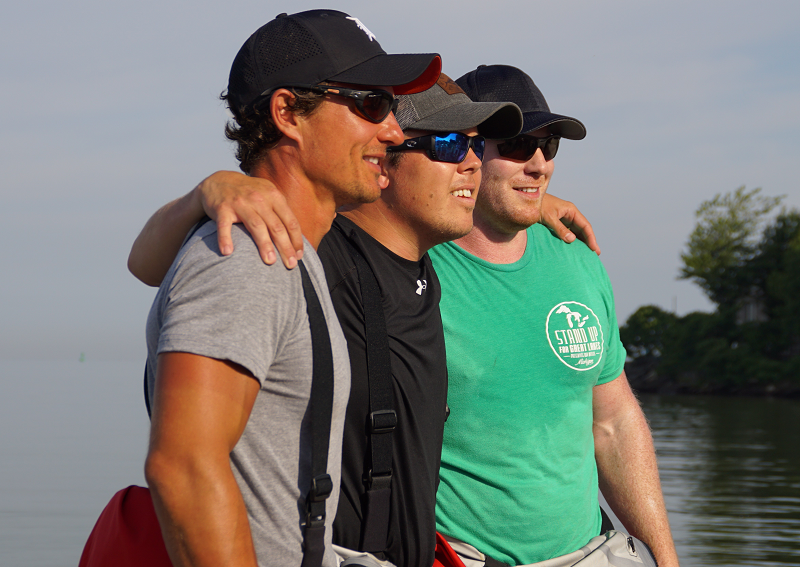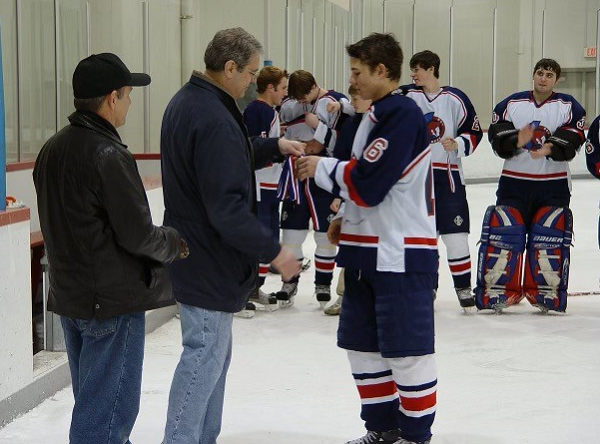
Garofalo: On-Ice Teacher and Recruiter
By
Rob Kaminski
MHSAA benchmarks editor
December 28, 2012
Something caught his eye as Allen Park’s Jim Garofalo circled the Olympic hockey rink in Salt Lake City to familiarize himself with the surroundings prior to the start of play at the 2002 Games.
“When the dimensions of a rink are laid out, everything is measured from the exact center of the ice outward,” Garofalo explains. “Usually there’s a washer or something small under the surface at center ice. All measurements are taken from there.
“Well, in Salt Lake City that year, a Canadian company was hired to prepare the sheets of ice, and they used a Loonie (common term for a Canadian $1 coin) to mark center ice. That year, the Canadians beat the United States in the gold medal game and won the Olympics on U.S. soil. I later visited the Hockey Hall of Fame in Toronto, and that Loonie is there.”
As Garofalo was getting acquainted with Canadian currency, an invitation in his mailbox back home went unanswered. At the time, MHSAA Tournament invitations were still sent by mail, so Garofalo was unaware the Association was awaiting his RSVP to accept his first Finals assignment.
“I was in Salt Lake City and had no idea. Now, of course, everything is online and by email, but that just shows how rapidly technology has progressed in the last 10 years,” Garofalo said. “So, (fellow official) Dan DiCristofaro calls and says something like, ‘Hey, do you want your state final?’ It was pretty funny; the running joke afterward was that you’ve gotta work the Olympics to get a shot at the state finals.”
Of course, that’s not the case. And, if Garofalo had it his way, all hockey officials who worked hard, persevered, paid their dues and set that as a goal would get a shot at the MHSAA Finals.
A 25-year registered MHSAA official who at one time juggled rules books for eight different hockey leagues and has worked four World Championships in addition to the Olympics, Garofalo now works only high school hockey.
“From a selfish standpoint, I suppose, I like a season that has a definite start and end to it,” says the New Boston Middle School social studies teacher, whose resume’ at one point looked like an endless Scrabble hand that included abbreviations for USA, USA Junior, Ontario, East Coast, International, International Independent and Central Collegiate hockey leagues in addition to the MHSAA.
“Being a teacher, there’s so much about the high school game that fits into education,” said Garofalo, now in his 10th year with the New Boston Huron District. “There’s so much to learn, and to help people learn at this level, from a playing and officiating standpoint.
“The people who officiate high school hockey are dedicated to improving, and as a veteran there’s an opportunity to help them learn and advance,” he says. “And, the coaches deserve kudos too. They are usually more professional and ask questions more properly than at other amateur levels. The reason is a direct result of them being accountable. They’ve got to answer to their principal or athletic director. Who are the junior and community league coaches accountable to? No one.”
 And, there’s another allure to the school game compared to which other levels pale.
And, there’s another allure to the school game compared to which other levels pale.
“The atmosphere of high school hockey is better than any other amateur level,” Garofalo says. “You go do a game at Trenton, and there’s a band. How many hockey games do you go to where there’s a band? Detroit Catholic Central and Birmingham Brother Rice have their cheering sections. It’s just a great atmosphere.”
It’s a scene that would surely help maintain the roster of younger, driven hockey officials. The trick is getting them there, according to Garofalo, one of the MHSAA’s biggest proponents for advancement and recruitment of officials.
Part of the issue is the oversaturation of games that fill Mite, Midget and other amateur schedules. Those who simply want a paycheck are never at a loss for work as long as they know how to skate.
“Hockey is unique because high school hockey is in progress at the same time as USA Hockey. An official can get twice the pay at a Bantam/Midget doubleheader than they can for one high school game,” Garofalo said. “The trouble is, who is instructing them? Who’s helping them to develop?”
To that end, Garofalo, DiCristofaro and the rest of the Northeast Hockey Referees Association established a $500 college scholarship. The recipient must be a high school hockey player who is officiating games in USA Hockey. Once they graduate from high school, many join the Association to work high school hockey.
Garofalo also offers other recruiting initiatives. In the Michigan Interscholastic Hockey League most schools play JV/Varsity doubleheaders, where the officials often let a linesman work a game at referee, while the experienced referee observes.
“At events like the Trenton Showcase, if we divide the fees differently we could get more officials involved,” he suggests. “We can do four-person crews to get our good young people some varsity experience as linesmen, and move some of our experienced linesmen to referee on the same crew with some of the top referees.”
It’s the kind of continual teaching that perpetuates the quality of officiating, and it takes time. The goal is to have the officials ready to perform when they hit the ice.
“If I put you out there to referee or pull lines, I set you up to succeed,” Garofalo says. “If I put people in too soon, I’ve set them up to fail, which leads to them leaving the game, and I haven’t done my job.”
The expectations and production of teacher and student must mesh for the system to work as intended. It requires patience as officials strive to climb the ladder, a bit of a lost art in today’s society.
“The culture of newer officials today is different. It’s a culture of immediate gratification,” says Garofalo. “Very few want to hang around eight to 10 years as a linesman before they referee, or move up. There are some very good officials who leave each year, because they haven’t become a referee, or haven’t got a tournament assignment.”
At the MHSAA Finals, Garofalo and DiCristofaro assist Jim Gagleard and the Livonia Ice Hockey Officials in heading up the off-ice officials. The inclusion and experience of such officials serves as a motivational tool which leads to improvement and retention. He also believes a four-person system in the MHSAA tournament would not only afford more qualified officials an opportunity for postseason assignments, but also provide better ice coverage as the sport’s speed has increased dramatically.
Not everyone can reach the summit, no matter the level. Even Garofalo himself, who once entertained dreams of skating in the NHL.
“The NHL looked at me a bit, but when I was at that age, it seemed all of the other linesmen were in their prime,” he said. “It is what it is.”
But, for a guy who began officiating at age 15 just to help pay for his hockey equipment, things have turned out quite well. In addition to the 2002 Olympics, Garofalo worked the Women’s World Championships in 1990, and the Men’s Worlds in Switzerland (1998), Norway (1999) and Germany (2001), working the Gold Medal game in 1998 and 1999. He’s been a fixture at the MHSAA tournament during the last dozen years.
“My wife, Mary Beth, says, ‘Wherever you go, you know someone.’ I owe that to officiating; the places I’ve gone and the people I’ve met,” Garofalo said. “It’s taken me all over the country instructing, and even overseas for some assignments. I can’t help but know people. It’s a people business.”
It might seem odd for Garofalo to even utter those words, describing the people-person this once shy kid has become. That’s one of the many rewards officiating delivers which is more valuable than any top-level assignment or game fee.
“I was quiet when I was younger. Well, when a coach is going crazy and yelling, you’ve got to speak for yourself. You learn conflict resolution,” Garofalo says, continuing as if he wrote the book on it. “‘Coach, get off the bench, quit screaming, and I’ll explain what I saw and why I called it the way I did. Then , if you have a question, I’ll answer it.’ You learn to communicate with people who don’t always agree with you.”
Then, there are the memories. Memories won’t buy a thing, but they go a long way in making 25 years on the ice, thousands of miles on the road, and countless hours away from home worth a million bucks.
“I worked 25 years for the IHL and AHL, and two years ago at the end of the regular season I was doing a Grand Rapids Griffins game. During the game, I told Brad May, ‘I’m done,’” Garofalo recalls, confiding in the gritty enforcer and one-time Stanley Cup champion who had more than 1,000 NHL games under his pads.
“At the end of the game, every guy and coach skated to me and shook my hand. Then Brad May says, ‘I heard you once worked the Olympics. It was an honor to be on the ice with you,’” Garofalo reveals, shaking his head. “Brad May said that to me.”
PHOTO: Jim Garofalo (center) officiate an NHL game. The Allen Park resident also has worked the Olympics.
NOTE: This is the sixth installment in the series "Making – and Answering – the Call" detailing the careers and service of MHSAA officials. Click the links below to view the others.

Traverse Bay Reps Teammates Unite to Take on Great Lakes Paddle Board Pursuit
By
Tom Spencer
Special for MHSAA.com
August 3, 2023
Twenty years ago, Kwin Morris and Jeff Guy were teammates on an MHSAA Quarterfinal-qualifying hockey team.
 Guy even scored the winning goal in the Regional Final for Bay Area Reps, which topped Traverse City West 2-1.
Guy even scored the winning goal in the Regional Final for Bay Area Reps, which topped Traverse City West 2-1.
This summer’s accomplishment, though, will go deeper in the history books.
Guy and Morris teamed up with Joe Lorenz to complete a dream that started a decade ago. They crossed all five of the Great Lakes on paddle boards while raising awareness and funds for water quality.
They put their balance, endurance and stick-handling skills together for the cause.
‘After 10 years and over one hundred grand raised for the lakes, it feels amazing,” Morris said. “I think the best part is knowing my kids will grow up knowing their old man did something cool for the environment in a unique way.”
It all started at a December social event in Traverse City. Guy, a financial adviser, and Morris, a middle school science teacher, had just gotten into paddle boarding when they began to wonder if they could cross Lake Michigan.
Lorenz, a personal trainer, promptly gave assurances they could — and joined them — even though he had never been on a paddle board prior to the holiday gathering.
Morris, Guy and Lorenz successfully crossed Lake Michigan in 2015, pausing in the cold of the night to look at the Northern Lights. They finished the nearly 100-kilometer journey in just under 25 hours. That accomplishment convinced them to launch Stand Up for Great Lakes, a non-profit organization to raise money and awareness for the protection of the lakes.
The trio also is supporting the Cooperative Institute for Great Lakes Research, a non-profit housed at the University of Michigan.
“It feels amazing to have finished crossing all five lakes and complete a lifelong goal,” Guy acknowledged. “The dollars and awareness we have raised is incredible, and hopefully it continues to grow.”
Lake Huron was the toughest to cross by far, the former Reps noted. The 90-mile, 29-hour paddle brought seven hours of rain and high waves.
“Plus Joe knocked me in and Jeff fell in after catching a fish,” Morris observed.
Ontario was the team’s second-hardest challenge and the shortest paddle. Huge waves from the side all day took quite a toll on the paddlers, who were accompanied by safety boats on each crossing.
Lake Superior featured glassy water, a spectacular sunset and the paddlers pausing to conduct a ceremony over the Edmund Fitzgerald shipwreck. The northernmost Great Lake ranks as the group’s favorite.
 Guy graduated from Kalkaska High School in 2003 and went on to play hockey at Hope College. He also played football, baseball and golf for the Blazers. He and his wife, Melissa, have a daughter, Emma.
Guy graduated from Kalkaska High School in 2003 and went on to play hockey at Hope College. He also played football, baseball and golf for the Blazers. He and his wife, Melissa, have a daughter, Emma.
Morris graduated in 2005 from Elk Rapids High School, where he also played baseball. He went on to get a teaching degree from Western Michigan University. He and his wife, Megan, have two children, Fitz and Knox. He now works for his former school district, teaching science.
The pair played for the Reps through a co-op hosted by Traverse City St. Francis that included athletes from Charlevoix, Elk Rapids, Kalkaska, Kingsley, Lake Leelanau St Mary, Mancelona and Suttons Bay. The Reps’ first coach was Michigan High School Hockey Coaches Association Hall of Fame inductee Rex Luxton. He coached through 2008.
Morris and Guy look back at their high school playing days and coach with fondness.
“We had some great teams, and I think I still have the career goal record there,” Guy recalled. “Also, our coach on the Reps Rex Luxton was highly motivational to me while playing for him and later in life.”
Morris echoed Guy.
“I loved the whole experience,” Morris said. “Playing for my high school … Friday night games … school rivalries … playing for Rex Luxton … amazing friends and teammates — almost surreal that it will have been 20 years.”
The former coaching staff of the Reps are not at all surprised Morris and Guy challenged themselves to make a difference for the Great Lakes.
The coaching staff remembers Guy as a natural scorer coming through with big goals, and Morris as a strong two-way player who scored five goals in one period in Sault Ste. Marie. The past coaches also remember all the traveling the two did for practice and games because of the geographic nature of the squad.
“I had no idea they had any interest in the water kind of stuff,” Luxton said of his former players’ feat. “When I started following their bid to raise awareness, it didn’t surprise me they would attempt something like this.
 “I think it illustrates how much determination they have and how much hard work they were willing to put in,” he continued. “It is just outstanding, particularly with the cold weather in the Great Lakes.”
“I think it illustrates how much determination they have and how much hard work they were willing to put in,” he continued. “It is just outstanding, particularly with the cold weather in the Great Lakes.”
Cody Inglis, a senior assistant director for the MHSAA, was an assistant coach for the Reps during all of Morris and Guy’s time with the co-op. He finds himself beaming with pride and happiness knowing these former players are giving back and making it a better world.
“What Jeff and Kwin have done physically and mentally to cross all of the Great Lakes on stand-up paddle boards is remarkable in itself,” Inglis pointed out. “When you add in the fact that they have put in charitable causes and the preservation of the Great Lakes as a reason for doing it – it makes it even more special.
“It’s not surprising given my recollection and remembrances of Jeff and Kwin, as they were really good hockey players and better people.”
High school hockey is where Morris and Guy’ friendship blossomed. Spending 24 or more hours together — and with Lorenz — has forged a greater lifetime bond that already had included being a part of each other’s weddings.
But they admit they had no inkling of this type of accomplishment back in high school.
“Sports were the most important thing in my life in high school,” Guy revealed. “Working really hard to win as many games as possible was the main goal – along with getting good grades and trying to get into a good college.”
But teamwork, learned on the ice and through other high school sports, can make anything possible.
“Any sport where you have to work as a team helps push yourself out of your comfort zone,” Morris concluded. “That's where the best things in life happen.”
2023 Made In Michigan
August 1: Vast Experience Shapes Retired MLB-er Gates Into 3-Time Finals-Winning Coach - Read
July 25: After All-American Career, Rockford's Bennett Making Impact as Mat Mentor - Read
July 20: Oakridge 3-Sport Star Potts Applying Lessons to 'Second Chapter' in Sales - Read
July 18: Frankfort Hoops Staff Bolstered by Past Stars Giving Back in Banktson, Kreski - Read
July 12: Championship Memories, High School Tennis' Impact Stick with Hackett Pair - Read
July 6: Brother Rice Finals Hero Aiming to Ace Family Life, Financial World - Read
July 5: Lapeer West 4-Time Finals Winner Set to Build Champions at Oklahoma - Read
PHOTOS (Top) Clockwise from top left: Jeff Guy celebrates a goal while playing for Traverse Bay Reps with Kwin Morris to his left, Guy (left) and Morris (right) take a photo after one of their paddle board trips, and Morris bringing the puck up the ice for the Reps. (Middle) Guy, Morris and Joe Lorenz take a photo together on the lake shore. (Below) Morris accepts a medal during the 2004-05 season. (Photos courtesy of Jeff Guy, Kwin and Jo Morris.)

